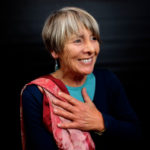Television producer and performer Andrew Denton has provided us all with some useful and important information about voluntary euthanasia in his podcast series and book, and has asked some interesting questions.
Unfortunately they are not the questions about dying with dignity that actually need to be answered.
Andrew is proposing a bureaucratic, literally tortuous process where we must seek and then obtain, over time, permission to die from doctors we do not know.
The whole question of seeking permission suggests that Australians need gatekeepers to control the most private of decisions: when do I want to die; when have I had enough? These are questions we may all have to ask ourselves, given the wonderful, ambiguous medicalised society we live in.
Surely how we die is a personal decision, and one we should be allowed to make ourselves?
The key question that needs to be asked is: Why can we not elect to die gently, legally, when, where and with whom we choose?
Unfortunately, what purports to be the Yes case for law reform on voluntary assisted dying is in fact what I call the Not Only …But Also position: not only must you be terminally ill and your death imminent, but also you must get permission.
Why is such a process necessary?
Yes we do need changes to the laws about dying. That question has been asked and answered with a resounding Yes for 20 years.
In response to the Not Only But Also position, we need to ask: Why do we need ‘permission’ at all?
Denton and Dr Rodney Syme and all the other advocates of the Not Only… But Also position are seeking to replace one sort of ‘gatekeeper,’ rooted in religious belief, for another. While they rightly seek to take power and control from the religious lobby, they then advocate that we give that power and control to the medical profession.
Some doctors and medical organisations have, like religious institutions before them, stepped up to assume a gatekeeper role: they seek to protect us from our own choices, and Denton and Syme propose we help them do it.
Both churches and doctors are unrepresentative groups hungry for power that does not belong to them. That power belongs to us, and through us, our politicians. That group, as Denton rightly points out, have totally abrogated their responsibilities to us by refusing to act to liberalize the laws, and by acting only to censor and restrict access to information about our current limited and illegal options.
There is a profound arrogance in the attitude of the Not Only But Also campaigners – the same arrogance displayed by those religious advocates who overturned the Northern Territory dying with dignity legislation, and of whom Denton is so critical.
The questions we need to be asking now are:[list type=”bullet”]
- Why do we need gatekeepers?
- Why should power and control not be in our own hands?
- Why do our decisions have to be verified and approved by doctors?
- Why are our political representatives such cowardly failures?
[/list]
What I am proposing instead is a law that would allow something that is already happening in Australia: the choice of taking Nembutal, and dying without violence.
We should be able to get a prescription for [re-]legalised Nembutal, and take it or not when we choose, not be forced to seek, and then be granted permission.
Hundreds if not thousands of Australians are now smuggling drugs and taking action themselves. But they must do it in secret, by breaking the law and without their family around them for fear of exposing them to criminal charges.
Andrew Denton has done valuable work in promoting this issue. However his ‘solution’, also advocated by Dr Rodney Syme and the Dying With Dignity organization, merely transfers the power and control, previously held by Churches and politico-religious campaigners, to doctors, not into your hands.
There is no need for such arrogance. Rather, some humility is needed.
There is no need for gatekeepers, no need to impose ‘solutions’ about this most personal of decisions.
To choose life or to choose death is, should, and must be a truly personal choice. Yes indeed as Denton quoted Mandela, ‘Let’s walk each other home’ – and let’s add ‘in ways we each choose ourselves…’
 | Born and educated in Melbourne, Dr Deb Campbell spent 25 years working operationally and as a research and policy analyst in intelligence, industrial relations and indigenous affairs in the private and public sectors, and in universities, in Victoria, Western Australia, and the Northern Territory. She holds a PhD in industrial relations history. Deb has written business book reviews for the mainstream press, contributed to local newspapers and self-published a history of a local community enterprise. Most recently she is the author of Doing Us Slowly: what’s happened to the Australian voluntary euthanasia debate? |
|---|

